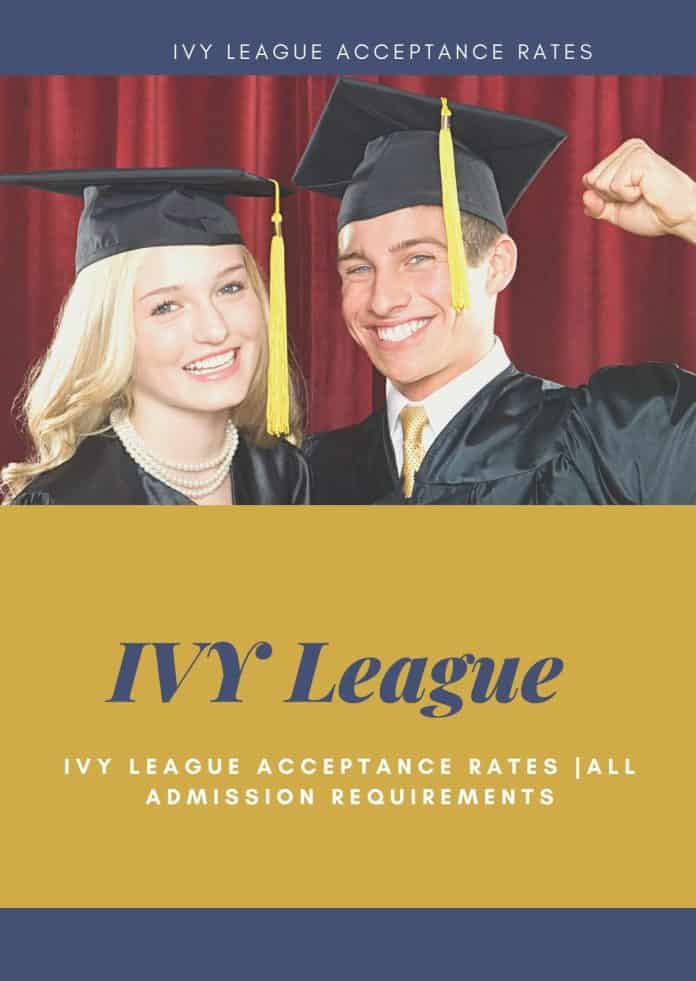This article examines the Ivy League acceptance rates and admission requirements critically. Graduating from any of these prestigious colleges as a student can give you a competitive advantage in the job market and establish your reputation as a distinguished scholar.
Ivy schools have highly selective admissions processes, as evidenced by the fact that the institutions accept only 7% of applicants on average.
Although that figure may appear discouraging, this article will teach you everything you need to know about getting into Ivy League schools.
If you want to get into the Ivy League, this guide can help you get a seat at any of these world-renowned institutions.
Table of Contents
About IVY League
The Ivy League is well-known among students globally. An Ivy League college is one of the eight schools that make up the Ivy League Athletic Conference.
They are academically rigorous, with some of the most advanced degree programs and facilities in the world. While there are many other prestigious universities around the world and in the United States, the Ivy League stands alone.
These Ivy League institutions are not only among the most competitive but also among the oldest in the United States. Some of them, such as Harvard and Yale, were founded before the United States was formally established, though their locations in Cambridge and New Haven have remained the same since their inception.
Although thousands of students apply each year, only the top students from secondary schools around the world are admitted to the Ivy League.
The Ivy League schools are:
- Harvard University
- Princeton University
- Yale University
- Dartmouth College
- Cornell University
- Columbia University
- University of Pennsylvania
- Brown University.
Why should you attend IVY League schools?
Here are the reasons you should consider attending one of the Ivy League institutions:
- Powerful Networking Opportunities
- World-Class Resources
- Higher Starting Salaries
- The power of name recognition
- The excellence of peers and faculty.
Powerful Networking Opportunities
The Ivy League has had graduates since the 1700s. The power of the alumni network is one of the most advantageous aspects of the Ivy League.
The alumni network is made up of all graduates from a specific university and typically goes far beyond college friendships.
Alumni connections can often lead to your first job after graduation.
These Ivy League institutions are well-known for their supportive alumni networks. After graduation, you will not only have a world-class education, but you will also be part of an elite group of graduates. Maintaining contact with Ivy League graduates can have a significant impact on your life and career.
Students can use this network to find internships that can lead to future employment opportunities before graduating.
World-Class Resources
Attending an Ivy League university provides you with access to research and study materials created by the brightest minds.
Ivy League professors are well-educated and passionate about specific topics and issues. These professors are encouraged and often required, to conduct research on these topics for the university. These thinkers generate new theories on topics that students are already studying, providing them with cutting-edge and timely research.
Higher Starting Salaries
According to a study conducted by the US Department of Education, graduates with a bachelor’s degree earned an average of $54,700 per year, while those with a master’s degree or higher earned an average of $65,000 per year.
Although having a college degree increases your salary, statistically, attending an Ivy League university can increase it even more. Here are the figures: Attending an Ivy League university can lead to a higher-than-average salary.
The power of name recognition
Ivy League graduates may benefit from a reputation associated with academic distinction—and thus desirability—because Ivy League universities are known for selectivity. As a result, when graduate programs, recruiters, or employers see an Ivy League school on your resume, this name recognition may carry extra weight in any evaluation.
The excellence of peers and faculty
Because of the selective nature of these universities, your child will be surrounded by outstanding students in the classroom, dining hall, and dorm.
While every Ivy League student has strong test scores and academic performance, the majority of Ivy League undergrads are also accomplished in extracurricular activities and are actively involved in their communities. This exceptional student body results in an enriching academic and social experience for all students.
Ivy League Acceptance Rates Overview
Acceptance rates to Ivy League schools vary by college. Their acceptance rates differ due to call sizes and the number of applicants. In 2022, the average acceptance rate for all Ivy League schools declined and fell below 5% for the first time.
Many people believe this is because these schools’ extensive recruiting efforts have resulted in an ever-increasing applicant pool during recent admissions seasons. Because of their reputation and prestige, Ivy League colleges attract a large number of applicants.
The fact that more than 95 percent of those who apply to these schools are not accepted does not deter those who are determined to graduate from one of the Ivy League schools. Students applying early decision to schools like Harvard, on the other hand, have a 15% chance of being accepted.
Ivy League schools Acceptance rates data
Harvard University
Harvard University accepts only 4.6 percent of applicants and requires a minimum GPA of 3.0. To be considered in good academic standing at Harvard, you must maintain a GPA of 2.0.
There is no standardized test minimum, but admitted students have SAT scores ranging from 600 to 800 in each section. Around 1570 is the 75th percentile score. ACT scores typically range between 33 and 35.
Princeton University
Princeton has a 5.8 percent acceptance rate. The college’s overall GPA is 3.46, with an average grade of A-. Princeton requires students to submit SAT or ACT scores as part of their applications. Accepted students’ SAT scores range from 1460 to 1570, while their composite ACT score ranges from 33 to 35.
Yale University
Yale University has a 6.3 percent acceptance rate. There is no minimum GPA requirement. Keep in mind that Yale requires SAT or ACT scores to be submitted. Approximately half of the admitted students have SAT scores between 1450 and 1560, and more than 86 percent have ACT scores between 32 and 36.
Dartmouth College
Dartmouth College has an acceptance rate of 7.9 percent. While there is no GPA cut-off for matriculating students at Dartmouth, the average undergraduate GPA of current Dartmouth students is 3.52. As a point of reference, the majority of admitted transfer students have a GPA of 3.7 or higher.
This indicates how important your grades will be to the admissions committee. A Dartmouth matriculant’s average SAT score is 1486. Dartmouth matriculants have an average ACT score of 33.
Cornell University
Cornell has the highest admissions rate of any Ivy League school, at 10.85 percent. The SAT ranges from 1420 to 1540. More than half of Cornell’s admitted students have SAT scores of 1500 or higher. ACT scores range from 32 to 35. Half of all Cornell matriculants have an ACT score of 34 or higher.
Columbia University
Columbia University has an admissions rate of 5.3 percent. This institution like the other Ivy League schools does not have a minimum GPA requirement. In terms of grades, you can calculate your GPA using Columbia University’s GPA calculator
University of Pennsylvania
The admission rate at UPenn is around 7.7 percent. UPenn, like many other Ivy League schools, does not have a GPA cut-off but states that high school performance is the most important factor in the applicant selection process.
Admission requires SAT or ACT test scores.
Brown University
Brown University has a 7.1 percent acceptance rate. The university has no minimum GPA requirement. Although this school does not officially report its students’ average GPA, all applicants must have outstanding secondary school transcripts.
Brown has made the submission of standardized tests optional for its applicants. This means you won’t have to submit your SAT or ACT scores.
Ivy League Admission Requirements
Here are the general requirements to be admitted into an Ivy League school:
- Strong Academic Performance
- Standardized Test Scores
- Personal Essay
- Letters of Recommendation
- Record of Extracurricular Activities.
Strong Academic Performance
These schools expect you to have excellent grades and to have taken the most difficult courses available at your high school. If your high school offers them, you should take advanced placement (AP) or international baccalaureate (IB) courses.
Standardized Test Scores
Most schools require SAT or ACT scores, though some make the exams optional. If you choose not to take the tests, the rest of your application must be compelling enough to place you among the accepted students.
Personal Essay
Most schools will ask you to write a personal essay or statement about your reasons for attending that particular school, your career goals, your previous leadership experience, or something similar. The goal is to demonstrate that you can write well and that you have something unique to offer that university.
Letters of Recommendation
As part of your application, you must submit at least one letter of recommendation, though more is preferable. Establishing positive relationships with teachers, coaches, or mentors ensures that you have adults in your life who can provide professional and personal feedback on your academic performance, drive, and character.
It will also ensure that you have strong recommendation letters from them.
Record of Extracurricular Activities
These schools seek applicants who are involved in extracurricular activities. Being the captain of your sports team, playing in the school orchestra, placing well in a national-level art competition, or competing in a science bowl or science olympiad are all examples of extracurricular activities.
FAQs about Ivy League Acceptance Rates
Is Getting into an Ivy League School Difficult?
Yes, getting into an Ivy League school is difficult. These esteemed universities are among the most selective in the world. However, with the proper preparation, you can increase your chances of acceptance.
What GPA is needed to get into Ivy League schools?
While admission is based on your overall admission profile rather than just your GPA, most schools accept students with a GPA of 4.0 or higher. Some programs accept students with GPAs between 3.5 and 4.0.
What ivy league school has the lowest acceptance rate?
Harvard is the Ivy League school with the lowest acceptance rate. Also, Harvard is the most difficult Ivy League to get into, with an acceptance rate of around 4.8 percent.
We also Recommend
- 25 Most Expensive Universities in the World
- USC Acceptance Rate | All Admission Requirements
- GMAT Score Chart: All you should Know & Easy Usage Tips
- 15 Best Online Universities in the USA
- 30 Best Community Colleges in the USA for International Students
- 50+ Best Universities in Australia for International Students.
Conclusion
With an increasing number of applications and high levels of achievement among American high school students, Ivy League acceptance rates are expected to remain low for the foreseeable future.
While these admissions statistics are disheartening, you can get into Ivy League and other elite schools by excelling in academics, extracurricular activities, and writing excellent college essays.
However, each Ivy League school is unique, and maximizing your chances of admission will necessitate slightly different approaches.



